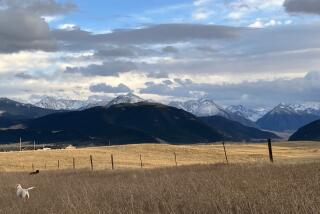A Relocation of the Heart : HEART MOUNTAIN <i> by Gretel Ehrlich (Viking: $18.95; 377 pp.; 0-670-82160)</i>
- Share via
There could not be a more appropriate publication time than now for this evocative World War II love story. Gretel Ehrlich’s powerful first novel begins as West Coast Japanese-Americans are relocated to desolate inland camps. The passion and the conflict concerning that unjust relocation echo to this day, having returned to front-page news with the recent passage of the Civil Liberties Act that authorizes $20,000 in reparations to each person incarcerated from 1942 to 1945.
Set in the wilds of northern Wyoming, “Heart Mountain” is about those who had to remain behind while sons and brothers fought the enemy. But back home, there’s conflict too: The town of Luster (pop. 200) gets a new neighbor that springs up practically overnight--the Heart Mountain relocation camp (pop. 10,000). Like the boys at the front, the cattle and sheep ranchers of Luster consider those in camp the enemy, and the resulting turmoil provides the driving force for several major characters that appear and reappear throughout the novel.
The “Heart Mountain” title could refer to matters of the heart and not just the geological peak that overlooks the relocation camp. When McKay, a young rancher whose brothers are fighting the war in the Pacific, accidentally injures Mr. Abe, a mask carver from Kyoto turned flower farmer before being interned, he meets the granddaughter, Mariko, an artist who has returned from Paris with her politically dissident husband. McKay falls for Mariko, and their desperate on-again off-again relationship forms the thread that binds Ehrlich’s story of heartache, loneliness and the search for love.
Ehrlich demonstrates her best writing in italic chapters that represent the innermost thoughts of Kai Nakamura, a UC Berkeley graduate student who is reunited with his parents in camp. The clash between the generations and the old-country cultures and the injustice of the relocation are caught in one diary-like passage:
Monday. Two days of gloom. The ground is bare and the sky is gray and trees are leafless. I’ve never seen a place that looks so dead. The Issei are in a state of shock over it. They had such high hopes for spring, thinking it would be like Japan, with cherry trees blossoming. I asked the guards just when spring did come to the Big Horn Basin. He gave me a funny look and said, “How do I know? I’ve only been in this state 18 months.” When I told Pop the joke, he didn’t understand.
Ultimately, Ehrlich’s novel is a disappointment. Too many minor characters occupy the spotlight far too long, while Mariko’s blossoming love for McKay remains too much a mystery. Some plot turns defy credibility, such as the sudden appearance of Kai Nakamura’s older brother, an Army Air Corps tail gunner who heroically flew 26 missions over Europe and North Africa. Or the fact that McKay’s loyal cook for 20 years happens to be a Japanese-American who feels compelled to search for relatives in the neighboring relocation camp.
Other affairs of the heart remain simply affairs of the loins. There’s McKay’s childhood sweetheart, Madeleine, whose husband is missing in the Pacific, but because their ranches adjoin, they are thrown together again during spring roundup. And, of course, there’s the enduring alcoholic cowboy who means well but is continually sidetracked in life by skirts and the bottle.
The author writes with grace and force concerning the agonizing choice Heart Mountain’s young men faced early in 1943: whether or not to swear allegiance to the United States and risk getting killed to fight for a country that branded you as disloyal. And, as the war winds down, there are equally ironic passages:
July, 1945. The “Powell War Dads”--a group of men from the nearby town--have signed a petition asking that when the war ends we promise to leave the state of Wyoming. In addition, they requested that in the meantime our passes be suspended. The Camp director retorted that 748 boys from the Heart Mountain Camp who are also fighting are as dear to their “war dads” as the boys from Powell.
Perhaps “Heart Mountain’s” real joy is just to be published. It is such a superb account of those dark war years it should be required reading for all Japanese-Americans. Most of all, “Heart Mountain” should be mandatory reading for those who question the monetary reparations being paid to the surviving Japanese-Americans who were so unjustly stripped of their constitutional rights. Every means of communicating what happened in those years of infamy from 1942 to 1945 should be used to tell this story over and over. We can’t let it happen again.
More to Read
Sign up for our Book Club newsletter
Get the latest news, events and more from the Los Angeles Times Book Club, and help us get L.A. reading and talking.
You may occasionally receive promotional content from the Los Angeles Times.










